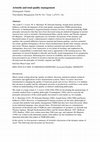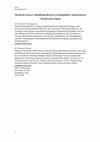Papers by Charles Schoengrund
The ecological approach used in this article suggests that children who have undergone chronic ad... more The ecological approach used in this article suggests that children who have undergone chronic adversity or acute cultural catastrophes during brain construction, such as genocide or many decades of colonial and authoritarian abuse, may pass on the adverse affects genetically and by means of sociopolitical enculturation instituted by autocratic policies. The adverse effects of violence and abuse on brain systems development effectively couples engaged cultures into one system whose domain is specified not by political borders, but by rage and retaliation cycles which continue reproduction of callous behavior, calculated violence and catastrophe.

Abstract:
We credit C. I. Lewis, W. A. Shewhart, W. Edwards Deming, Joseph Juran and Kaoru Ishika... more Abstract:
We credit C. I. Lewis, W. A. Shewhart, W. Edwards Deming, Joseph Juran and Kaoru Ishikawa with the development of the total quality management (TQM) epistemology. However, so fundamental to organized human existence are basic concepts underlying TQM principles and practice that they have been discussed using pre-industrial language in ancient classical texts such as Aristotle's Nichomachean Ethics and de Anima, and Thomas Aquinas' De Magistro . Of particular significance are Aristotle's discussions of the dynamic and functional nature of 'good', a phenomenon's implicit criterion for measurement of its qualities, the essential difference between material and human qualities, and how potential, not actual, qualities belonging to diverse observed phenomena should order strategy, mission and vision. Thomas Aquinas comments on intrinsic potential and motivation to learn, distinguishes 'discovery' from 'instruction' as two kinds of teaching, and emphasizes the mentor's responsibility to understand when each is appropriate to the learning process. The importance of classical thought to ethically and fiscally sound management at two proprietary universities is discussed, illustrating how erosion of credibility and fiscal crisis could have been prevented in one of them if executives had put into practice management policies flowing from the principles of Aristotle, Aquinas and TQM.
Full Text Word Count: 6527
ISSN: 0954-4127 DOI: 10.1080/09544129650035061 Accession Number: 9605062970
Drafts by Charles Schoengrund
Complex brain-environment interactions influence biological systems organization and early childh... more Complex brain-environment interactions influence biological systems organization and early childhood development affecting local cultural traditions and political behavior. One of the trajectories human development may take involves early childhood adversity (ELA) and the construction of antisocial personality traits consistent with autocratic governance. Neuroscientific evidence shows that motivation system processes implicated in essential behavior operate at a preconscious level, which would suggest that lasting effects of early life conditions may play a role at least as important as conscious ideological choice in the generation and support of autocratic states.

Charles Schoengrund is a cultural anthropologist and architectural designer who received an inter... more Charles Schoengrund is a cultural anthropologist and architectural designer who received an inter-disciplinary PhD from The University of Wisconsin-Madison. He examined visual tradition and political propaganda in Romania and Portugal, and was later affiliated with The Committee on Human Development at The University of Chicago. Research has appeared in Total Quality Management. Dr. Schoengrund is currently researching the relationship between human development, perception and political practice. ABSTRACT: Efforts by local citizens, architects, and provincial planners to introduce sustainable architecture in northwestern Spain have been met with local regulatory obstacles. This article examines how customary ways of conducting business impede efforts to introduce energy-efficient, environmentally sound building technologies. Because considerable resources are expended during project planning and construction, and significant economic and symbolic value is placed on completed projects, architectural planning and construction practice can reveal how elite players and dominant groups compete for and control local political and economic resources to the detriment of environmental policy initiatives. This turns project permits into a scarce and valuable commodity, making them a source of power and capital.

Uploads
Papers by Charles Schoengrund
We credit C. I. Lewis, W. A. Shewhart, W. Edwards Deming, Joseph Juran and Kaoru Ishikawa with the development of the total quality management (TQM) epistemology. However, so fundamental to organized human existence are basic concepts underlying TQM principles and practice that they have been discussed using pre-industrial language in ancient classical texts such as Aristotle's Nichomachean Ethics and de Anima, and Thomas Aquinas' De Magistro . Of particular significance are Aristotle's discussions of the dynamic and functional nature of 'good', a phenomenon's implicit criterion for measurement of its qualities, the essential difference between material and human qualities, and how potential, not actual, qualities belonging to diverse observed phenomena should order strategy, mission and vision. Thomas Aquinas comments on intrinsic potential and motivation to learn, distinguishes 'discovery' from 'instruction' as two kinds of teaching, and emphasizes the mentor's responsibility to understand when each is appropriate to the learning process. The importance of classical thought to ethically and fiscally sound management at two proprietary universities is discussed, illustrating how erosion of credibility and fiscal crisis could have been prevented in one of them if executives had put into practice management policies flowing from the principles of Aristotle, Aquinas and TQM.
Full Text Word Count: 6527
ISSN: 0954-4127 DOI: 10.1080/09544129650035061 Accession Number: 9605062970
Drafts by Charles Schoengrund
We credit C. I. Lewis, W. A. Shewhart, W. Edwards Deming, Joseph Juran and Kaoru Ishikawa with the development of the total quality management (TQM) epistemology. However, so fundamental to organized human existence are basic concepts underlying TQM principles and practice that they have been discussed using pre-industrial language in ancient classical texts such as Aristotle's Nichomachean Ethics and de Anima, and Thomas Aquinas' De Magistro . Of particular significance are Aristotle's discussions of the dynamic and functional nature of 'good', a phenomenon's implicit criterion for measurement of its qualities, the essential difference between material and human qualities, and how potential, not actual, qualities belonging to diverse observed phenomena should order strategy, mission and vision. Thomas Aquinas comments on intrinsic potential and motivation to learn, distinguishes 'discovery' from 'instruction' as two kinds of teaching, and emphasizes the mentor's responsibility to understand when each is appropriate to the learning process. The importance of classical thought to ethically and fiscally sound management at two proprietary universities is discussed, illustrating how erosion of credibility and fiscal crisis could have been prevented in one of them if executives had put into practice management policies flowing from the principles of Aristotle, Aquinas and TQM.
Full Text Word Count: 6527
ISSN: 0954-4127 DOI: 10.1080/09544129650035061 Accession Number: 9605062970